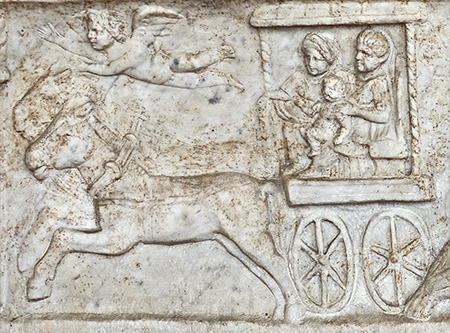 Detail
of a family outing (full
sarcophagus relief)
Detail
of a family outing (full
sarcophagus relief)
 Detail
of a family outing (full
sarcophagus relief)
Detail
of a family outing (full
sarcophagus relief)
Although legally she, like the rest of the family, deferred to the patria potestas of the paterfamilias, the world of the family and its locus in the domus was the domain of the materfamilias, who wielded her not inconsiderable authority over it through honor and long-standing custom. Marriage and motherhood remained the defining roles for Roman women; there was no Latin word for a respectable female who never married. Her first priority was her role as perpetuator of the family line and progenitor of legitimate citizens; as such she was required to keep her honor intact and to raise children who would bring glory to the family and the state. She brought with her to her husband's home a distaff and spindle and on her wedding night was given by her husband the gifts of fire and water, symbols of her domestic responsibilities, with the expectation that she as matrona would manage and increase his household with her labors. While upper-class women had slaves to help with the weaving (a defining task of the materfamilias, as seen on this tombstone of Regina described below), cooking, cleaning, and rearing of children, her lower-class counterparts did the same tasks with little assistance. The poorest families suffered from scarcity which forced some to expose or sell their children into slavery; most slaves lived materially better lives than the very poor but they were denied the status and comfort of marriage and family life, as their partner and children were the property of their master. The citizen family was the foundation on which the state was built, where children first learned by training and example from a stern mater the core cultural values of pietas (dutifulness, reverence), obsequium (respect, submission), affectio (relationship, caring). The elite Roman familia was an all-embracing term, including as it did kin (from the nuclear family through the gens), household members (slaves, liberti), properties and goods, and unrelated resident dependents; deaths in childbirth and battle, divorces, remarriages, and adoptions created complex familial patterns. Given the legally dependent status of women on male kin or guardians, an upper-class household might contain an inordinate number of women in a wide variety of relationships: mother, wife, daughter, sister, aunt, cousin, niece, granddaughter, ward. For further information see Bradley (1991), Dixon (1992), Rawson (1986, 2011), Saller (1999), Tatarkiewicz (2023), Treggiari (2003) in the Bibliography; see also Images of Family below.
| Text-Commentaries | Additional Readings |
|---|---|
| Quintus Asconius Pedianus, Ciceronis In Pisonem Enarratio Orationis 13: the traditional home | See the Latin reader The Worlds of Roman Women for the following texts: |
| M. Tullius Cicero, Pro Caelio 33-34: Clodia Metelli | C. Cornelius Tacitus, Agricola 4.1-4: Julia Procilla |
| Titus Livius, Ab Urbe Condita I.46-48, 59: Tullia minor | C. Cornelius Tacitus, Dialogus de Oratoribus 28-29 (excerpts): mater, the first teacher |
| Ambrosius Theodosius Macrobius, Saturnalia II.5.1-5, 9: Julia, daughter of Augustus | L. Annaeus Seneca (minor), Ad Helviam Matrem de Consolatione 14, 16, 19 (excerpts): Helvia grieves for her son |
| Valerius Maximus, Memorabilia IV.4: Cornelia Gracchorum | Petronius Arbiter, Satyricon 37, 67, 76: Fortunata at dinner |
| C. Suetonius Tranquillus, Divus Iulius 6: Julia, aunt of Caesar | ILS 1046a, Funerary Inscription: Terentia, for her brother |
| P. Cornelius Tacitus, Annales V.1: Livia, mother of Tiberius | C. Nepos, De Viris Illustribus: Cornelia's letters to her son |
| P. Vergilius Maro, Aeneis VIII.407-415: materfamilias | Sextus Propertius, Elegiae 4.11: Cornelia's farewell to Paullus |
| C. Plinius Caecilius Secundus (minor), Panegyricus 84: Trajan's sister Marciana | M. Tullius Cicero, Epistulae ad Familiares 14.4, 20: scenes from a Roman marriage |
| Silius Italicus, Punica VI.415-451; 497-520: Marcia, Regulus, Serranus | ILS 8394 Laudatio Funebris Murdiae (excerpts) |
| P. Cornelius Tacitus, Agricola, excerpts: Agricola's wife, mother of Tacitus' wife | |
| Decimus Magnus Ausonius, Parentalia 19, 21: three sisters | |
Funerary Inscriptions: |
See De Feminis Romanis at Diotima for the following online Latin texts: |
| for Julia Secunda & Cornelia Tyche | C. Nepos, De Viris Illustribus, frag. 59: The Letters of Cornelia |
| for Aelia Sabina | M. Tulius Cicero, Pro A. CluentioV.12-VI.1: Sassia, wicked mother |
| for Aurelia Agrippina | P. Vergilius Maro, Aeneid V.779-798: Venus seeks aid |
| for Caecinia Bassa for Octavia Arbuscula |
L. Annaeus Seneca (minor), Ad Marciam de Consolatione III.3 - IV: maternal grief |
| by Sextia Psyche | See Vindolanda Tablets Online: Claudia Severa to Lepidina |
| for Annia Isias | |
| for the familia Allidia |
All images are courtesy of the VRoma Project's Image Archive.